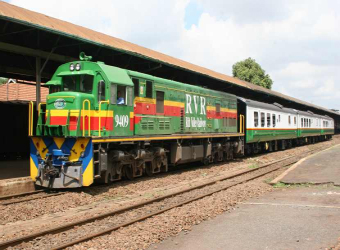Africa Railways, a core subsidiary of leading regional investment company Citadel Capital, has acquired a 34% stake in the national rail operator of Kenya and Uganda. The US$ 37.8 million transaction, which was executed yesterday, brings Africa Railways’ total ownership of RVR to 85%.
The selling party is TransCentury, a Nairobi-listed infrastructure company.
As part of this transaction, Africa Railways shareholders including Citadel Capital have together committed USD 80 million to increase Africa Railways’ capital to USD 200 million. Of that USD 80 million in fresh capital, USD 37.8 million has been used to finance the acquisition of shares from TransCentury, while the balance will be injected into Rift Valley Railways (RVR) to support the ongoing five-year turnaround program.
“Citadel Capital and its limited partners believe the citizens and business communities of Kenya and Uganda have a right to a world-class railway that serves as an engine of national development and regional integration. We are honored to continue working with our partners in RVR and in Africa Railways to structure, advise and fully fund RVR’s turnaround story,” said Ahmed Heikal, Chairman and Founder of Citadel Capital, the leading investment company in Africa and the Middle East. “RVR is one of the most exciting investments in our portfolio and our most significant investment in East Africa.”
Citadel Capital first acquired a minority stake in RVR in 2010, eventually becoming lead shareholder via Africa Railways. The firm has since led the creation and full financing of a five-year, US$ 287 million turnaround program for what was then an ailing railway at risk of defaulting on its concession agreements with the governments of Kenya and Uganda.
Africa Railways shareholders include leading global institutions, among them the IFC African, Latin American and Caribbean Fund, LP (ALAC), a private equity fund managed by the IFC Asset Management Company, LLC; Dutch development bank Nederlandse Financierings-Maatschappij voor Ontwikkelingslanden N.V. (FMO); German development finance institution DEG; FISEA, a vehicle dedicated to investment in Sub-Saharan Africa owned by France’s Agence Française de Développement and managed by its subsidiary PROPARCO; and the International Finance Corporation (IFC).
“With the backing of leading development finance institutions and specialist investors, we have invested more in RVR in the past two years than was invested in the previous twenty-five,” said Heikal.
“From a slow start under the previous concession owners, Africa Railways and its partners have worked closely with RVR management to help the company make good on its promise to both the governments and people of Kenya and Uganda,” said Karim Sadek, Citadel Capital’s Managing Director for Transportation Investments. “Our partnership with TransCentury has been an important part of the progress RVR has made with its turnaround to date; we are open to working closely with them going forward in this and other investments.”
“We have led the replacement of hundreds of kilometers of decrepit track and completed the first phase of the rehabilitation of 500 kilometers of track that links Kenya with Tororo in Eastern Uganda and Gulu in the north, ending two decades of disuse and inefficiency. The railway is more efficient and more dynamic — and is now supported by world-class technology and rehabilitated rolling stock as part of an ongoing reconditioning program,” Sadek Said
For the first time, the entire network is managed through a state-of-the-art GPS-based control room from the company’s headquarters in Nairobi; moreover, RVR is now moving into a phase that will see it purchase new locomotives, doubling its fleet size in the coming 12 months.
Concluded Heikal: “RVR will continue to provide reliable, cost-effective transportation solutions to East Africa’s emerging oil, gas and manufacturing industries, among the many other sectors driving growth in this dynamic region. We have so far only scraped the surface of what is possible.”
Citadel Capital is presently transforming its business model to become an African leader in infrastructure and resources with investments in five core sectors: energy, transportation, agrifoods, mining and cement.


